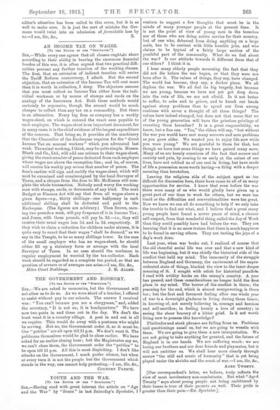YOUTH AND THE WAR. [To TIM EDITOIE or TKO "
SPROTATOII."]
Stn,—Having read with great interest the article on " Age and the War" by " Senex" in last Saturday's Spectator, I venture to suggest a few thoughts that must be in the minds of many younger people at the present time. It is not the point of view of young men in the trenches nor of those who are doing active service for their country, but of one who, debarred from doing anything on a large scale, has to be content with little humble jobs, and who claims to be typical of a fairly large section of the youthful part of the community. What do we feel about the war P Is our attitude towards it different from that of our elders P I think it is.
I hear many elderly people mourning the feet that they did not die before the war began, or that they were not born after it. The values of things, they say, have changed. The world has become, they say, a darker place. We all deplore the war. We all feel its big tragedy, but because we are young, because we have not yet got deep down into the ruts of life, we are not afraid. Is it not better to suffer, to ache and to grieve, and to knock our heads against stony problems than to spend our lives among cushions with never a thought of all these things? The values have indeed changed, but does not that mean that we of the young generation will have the priceless privilege of recasting them hereafter? It is a great responsibility, we know, but a fine one. " Yea," the elders will say, " but without the war you would have met many sorrows and sore problems as you grew older. We wanted you to enjoy life now while you were young." We are grateful to them for that, but though we have lost some things we have gained many more. Many of us are keenly conscious of the fact that sorrow and anxiety and pain, by coming to us early at the outset of our lives, have not robbed us of our zest in living, but have made of life a possession more worth having—a thing with a deeper meaning than heretofore.
Leaving the religious side of the subject apart as too difficult for discussion here, there have come to all of us many opportunities for service. I know that even before the war there were many of us who would gladly have given up a great part of our time to work for others, but we were too timid or the difficulties and conventionalities were too great. Now we know we can all do something to help if we only take the trouble to find out what, and I believe that a great many young people have found a newer peace of mind, a cleaner self-respect, from that wonderful thing called the Joy of Work than they could possibly have bad before the war. They are learning that it is no mere truism that there is much happiness to be found in serving others. They are tasting the joys of a day's work done.
Last year, when war broke out, I realized of course that the old cheerful social life was over and that a new kind of life was beginning, but it was chiefly the historical side of the conflict that held my mind. The immensity of the struggle between England and Germany, the excitement of the unpre- cedented state of things, blocked the view to the inner deeper meaning of it. I sought with relish for historical parallels. I read with avidity books on the enemy's country. A year has passed, and these considerations no longer hold the first place in my mind. The horror of the conflict is there; the yearning for the end, which is almost overpowering, is there too ; but the first and foremost feeling after one whole year of war is a downright gladness in living during these times; in knowing of, not merely believing in, courage and heroism and self-sacrifice; in feeling keenly a love of country ; in seeing the sheer bravery of a bitter grief. Is it not worth living now to possess this knowledge ?
Platitudes and stock phrases are falling from us. Problems and questionings assail us, but we are going to wrestle with them. Wo are going to give them a new interpretation. We are not going to take anything for granted, and the future of England is in our hands. We are suffering much we are losing our brothers and our dear friends and playmates, but it will not embitter us. We shall hear more clearly through sorrow "the still sad music of humanity" that is yet being played under the shrieks and the crash of war.--I am, Sir, ic.,
AGED TWEE-Pr.
[Our correspondent's letter, we believe, truly reflects tho view of most involuntary non-combatants. But what "Aged Twenty" says about young people not being embittered by their losses is true of their parents as well. Their pride is greater than their pain.—En. 'Spectator.]


































 Previous page
Previous page